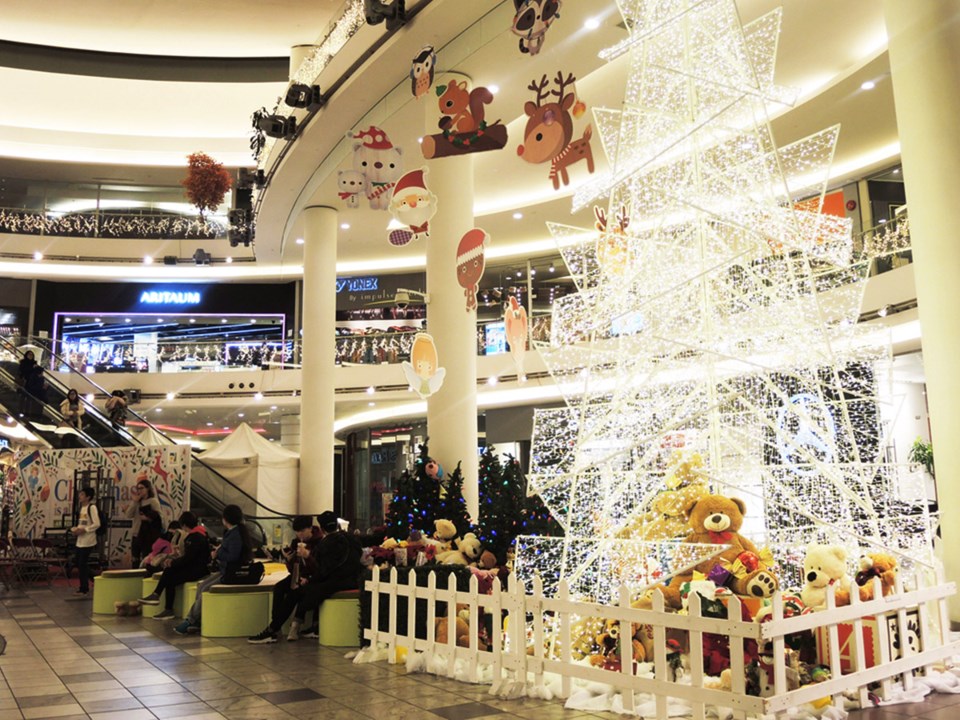Richmond is known for its many shops and brands. And as Christmas approaches and people are busy checking off their shopping list, retailers in the city are preparing for a revenue boost in the last week before the big day.
“Traffic has been steadily growing since November,” said Joey Kwan, director of promotions and public relations at Aberdeen Centre.
“We are expecting to see a lot more traffic over the weekend and the day before Christmas, when people come here for their last minute shopping.”
A survey shows that British Columbians plan to spend around $660 on average for gifts for Christmas this year, an eight percent increase from last year.
“It is the biggest purchasing time of the year and by far the biggest expenditures made by consumers,” said David Hardisty, assistant professor of marketing and behavioural science division at the University of B.C.
“Usually that’s what makes the difference between being profitable or not, so it’s super important for retailers.
“Also, Christmas shopping tends to be less affected by the economy than other times of year, since people would be more likely to spend money on gifts for others.”
To compete for the bonus season, shopping malls and retailers have come up with various strategies to attract consumers.
Aberdeen Centre has set up a special Christmas display, including a big Christmas tree and a giant sofa for customers to sit on. The centre also invites schools and choirs to come to the mall to perform Christmas carols.
“People will come to the mall, take photos with the displays, or watch the performances. Then it is very natural for them to go to the stores, and if they see something they like, they will buy it,” said Kwan.
Richmond Centre, meanwhile, provides gift-wrapping services and complimentary beverages and snacks, according to the mall’s general manager, Sheila Luft.
“The preparation started a year ago,” said Luft.
“We play Christmas music the whole time...and we also incorporate a digital approach with customers in the holiday season.”
Hardisty said stores try to make the mall a happy place where people enjoy spending time.
“Some research shows the longer you spend in a store, and the longer any consumer stands in a store, the more they tend to buy,” he added.
Pre-Christmas bargains sparse
However, Hardisty pointed out that Christmas time is not necessarily the best time for consumers to shop for bargains.
“Typically overall, prices are not cheaper right before Christmas because it is a time when everybody needs to buy,” said Hardisty.
“Sometimes it looks like a big sale but isn’t really. For example, something can be sold for $100 normally and the merchants can say it’s regularly $200 but they marked it down.”
He said a popular strategy at Christmas is bundling — grouping many products together for one price.
“It seems like a good deal because you get a lot of things for a slightly lower price but you probably wouldn’t have bought each of those things individually.”
Social aspects to gift exchanges
“Christmas shopping is good for those who enjoy the atmosphere, or who have to buy gifts. The social consequences of not buying gifts for anybody would be much worse than the money you would save by waiting until Boxing Day sales,” chuckled Hardisty.
Some people have criticized exchanging gifts at Christmas as a waste of money, while contributing to clutter by receiving things one doesn’t necessarily need.
Hardisty said the best way to avoid that is to ask and only buy gifts that others need.
“If you buy something for somebody and they don’t want it, then you are wasting your time and money, and it’s bad for the environment, and the other person will also feel bad,” said Hardisty.
“It seems to be too easy to ask somebody what they want and then get it for them. But research shows that if you ask somebody what they want and you give them that thing that they asked for, they are happy.
“First of all, they got the gift they wanted and also it shows that you are listening to them.”
Another tip from Hardisty is to trade interesting experiences the person may like rather than material objects.
“It can be concert tickets, or kart racing, something you could do together. Those make great gifts,” said Hardisty.
“They also lead to more connections between people and more memories to talk about. And of course, it’s often better for the environment.”



